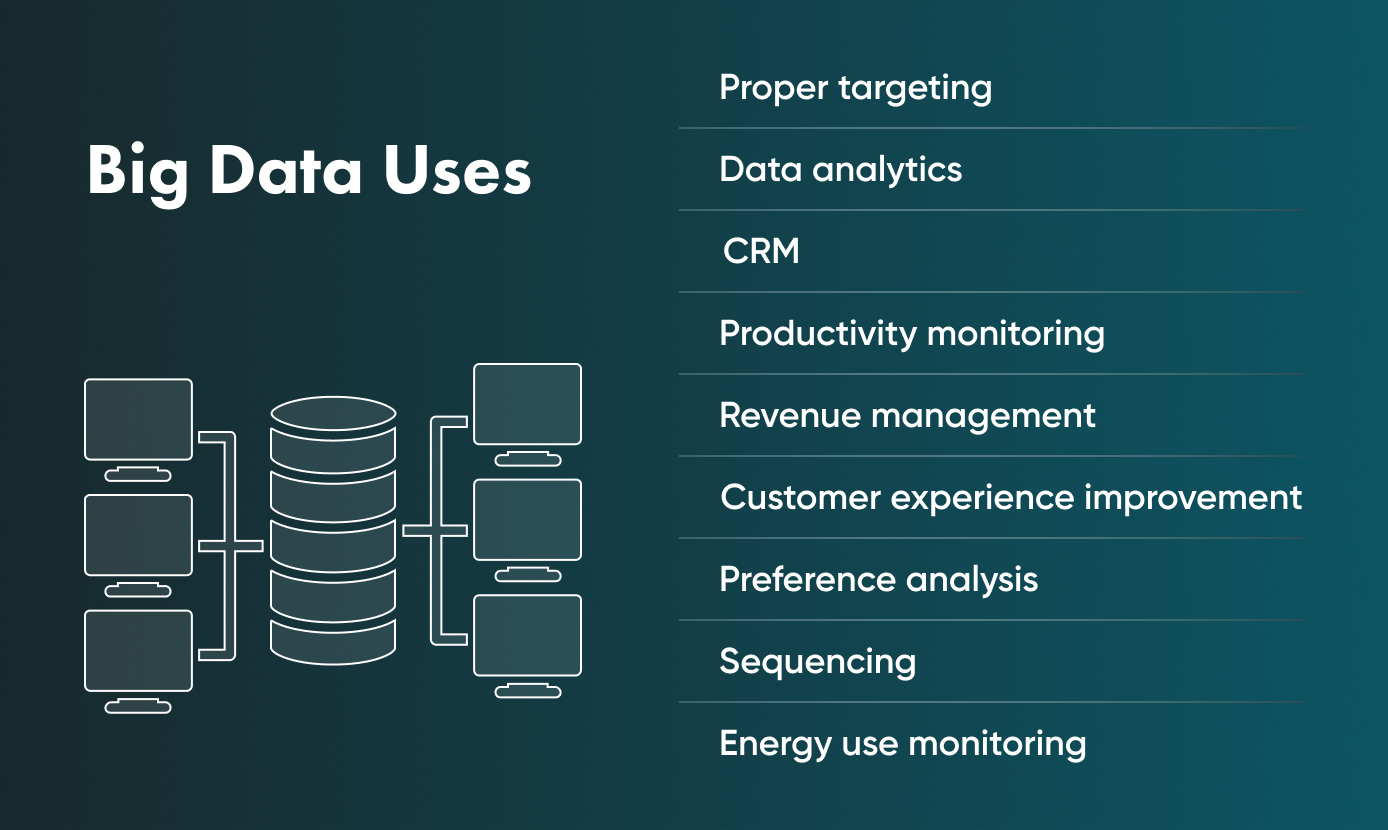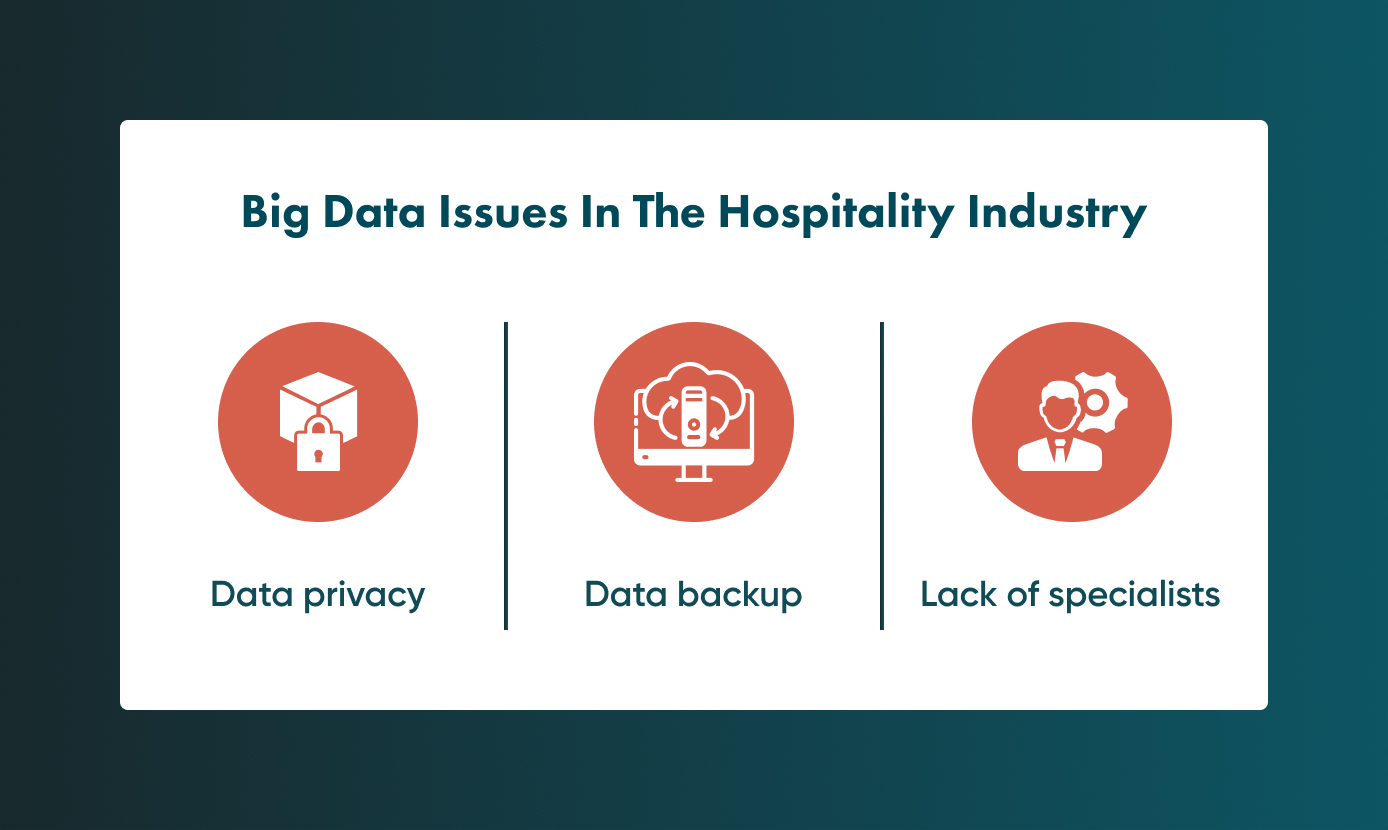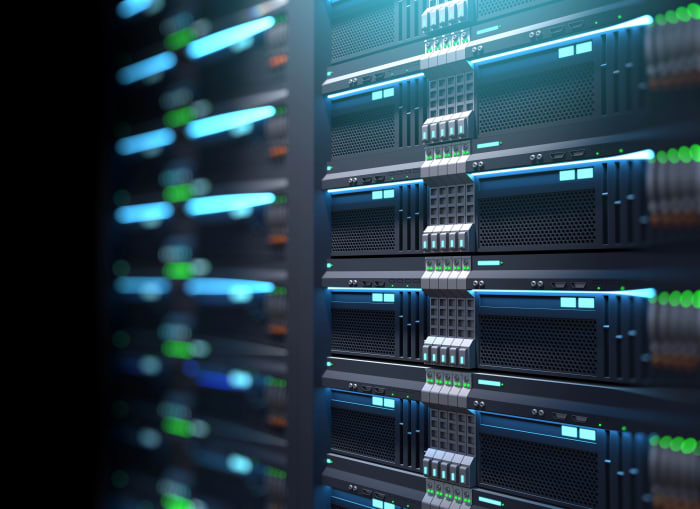Big Data in the Hospitality Industry


Our recent articles about changes in the hospitality industry show that digital technologies revolutionise the industry and create new opportunities for business owners to gain profit and provide customers with top-level service quality.
Big Data is another technology we would like to cover in this article and its impact on the hospitality industry. Big Data definition, uses, and challenges — find out about it below in detail.
Big Data In A Nutshell
Big Data implies vast massifs of unsorted data and a set of tools for their processing. The Big Data concept includes information about processes and activities. This information is collected, stored, analysed, and then specialists can make realistic predictions and conclusions. The more the system learns, the more realistic the predictions are.
Let’s take an example. Whenever somebody opens the application on a smartphone, visits a website, signs up somewhere on the Internet, or simply inputs a query in the search system, a specific data amount is collected.
Users focus more on the eventual results of their activities on the Internet than on activities that take place “behind the scenes”. For example, a user inputs the “Big Data in hospitality” query, and he or she comes across this article. This single query leads to the creation of a large data amount.
Just imagine how many people are surfing the Internet at the moment, visiting various websites, uploading images, and performing other activities. Naturally, therefore, there are vast amounts of data being processed continually.
The development of Big Data solutions requires the skills of a qualified company like Go Wombat. So contact us — we can help you navigate this ocean of data!
Big Data Use Cases In The Hospitality Industry
The capabilities of Big Data in the hospitality industry are far-reaching. This technology helps hoteliers and other hospitality-related businesses improve their business processes.

Proper targeting
Businesses use Big Data algorithms to personalise their websites and target each audience group separately to meet their demands. It helps companies identify the strong and weak points of their business, attract more customers, and create loyalty.
Data analytics
Depending on the business type, it may require the use of descriptive analytics (the analysis of previous activities), predictive analytics (prediction of future trends and tendencies in the hospitality industry), prescriptive analytics (an advanced type of predictive analytics where complex AI-based algorithms are used). Therefore, analytics enables a more thorough analysis of all business-related data. Big Data analytics in the hospitality industry has a great impact on the entire sector. All these aspects also feed the consideration of using robotics within the hotel industry.
Customer Relationship Management (CRM)
CRM software is necessary for all companies with many customers, and it is essential to treat each customer in the best way. Using Big Data algorithms, CRM makes it possible for administrators to process amounts of data quickly and efficiently, build personalised connections with customers, create enticing discounts, and promote the business according to customers’ needs.
Productivity monitoring
Big Data allows managers to analyse employees’ productivity and specific processes to identify the productivity level, weak and strong sides of each employee, and find an optimal solution to increase the productivity index of staff.
Revenue management
Hotels, restaurants, and travel agencies can use Big Data to build a revenue management strategy. They can use predictive analytics to make predictions for future demands for their businesses, evaluate how many essentials their hotel or restaurant needs, and avoid extra expenses. Also, Big Data is used to optimise room rates and increase revenue.
Customer experience improvement
Gathering use of services data, customer feedback, and other crucial information helps businesses understand their customers better and improve customer experience. If you see negative feedback, you should do everything to prevent such circumstances in the future and ensure that all customers are satisfied with your services.
Preference analysis
It means that you should not only gather information about services customers use, but also services they would like to use based on their feedback and expectations. This enables you to identify what customers desire and provide them with it. Remember that all customers want to be heard, and when they know you try to deliver a good level of service, the chance of them becoming loyal customers increases.
Sequencing
Using Big Data it is possible to analyse the actions of each customer and build their sequence. Analysis of customers’ preferences enables providing them with the combination of services they order frequently. It is another way to improve customer experience.
Energy use monitoring
One more Big Data use we cannot neglect is the monitoring of energy use. The Go Wombat company can create Big Data-based software that will help you monitor energy consumption in your hospitality business and improve it with accurate predictions. As a result, you will be able to reduce costs.
Start your own business with reliable software development partners — contact Go Wombat!
Limitations Of Big Data In Hospitality
It is vital to be acquainted not only with the advantages of Big Data use but some concerns about big data in the hospitality industry. No doubt, some of these you may come across while integrating Big Data solutions into your business.

Data privacy
Data processing always means working with confidential data that should not be disclosed to third parties. However, cyber attackers never sleep, and fraud attacks may harm the integrity of the data infrastructure and lead to significant losses.
These areas need consideration of both cybersecurity and regulations such as GDPR, within Europe.
To find out more, take a look at our articles on cybersecurity, and GDPR regulations.
Customers need to be confident that their data is protected and that hackers won’t steal it. Therefore, you need to make sure that you use up-to-date encryption techniques and that all information is unavailable to unauthorised third parties.
At Go Wombat, we pay careful attention to data protection. Our Chief Security Officer always adheres to the best encryption standards and ensures that all software we create has encryption methods integrated.
Data backup
Apart from data protection, it is necessary to ensure that data won’t be lost due to malware attacks or some network failures. The advice of Go Wombat is to use cloud servers to store all data, so it will always be backed up. Then, in case of an emergency, all data will be safe, and it won’t affect your business processes.
Lack of specialists
Although our company assumes the most complicated development steps, your business needs data specialists who will be in charge of data analysis. So you need to recruit a skilled professional for working with data massifs. However, we continue maintaining software created by us, so we will be able to work together with your specialists to ensure the proper functioning and smooth integration of software into your hospitality business.
Finally, don’t forget to invest in business process improvement. Of course, all upgrades go hand-in-hand with investments, so you need to be prepared for additional expenses. However, a wise approach to business promotion will lead to revenue increase and enhanced customer satisfaction.
We would be happy to be your assistant in software development, and we are open to any type of software development project.
Unlock Success with Premium Software Development
Contact us


Conclusion
Big data sounds scarier than it possibly is. The activity of collecting, storing, and analysing vast amounts of information allows specialists to make realistic predictions and conclusions. The main idea is to create an environment where the system learns as much as possible. This will enable more realistic predictions.
By incorporating Big Data systems into a business such as within the hospitality industry, hoteliers are able to make more accurate predictions on the preferences of future clients.
If you have any ideas you would like to discuss Contact us today!
How can we help you ?






